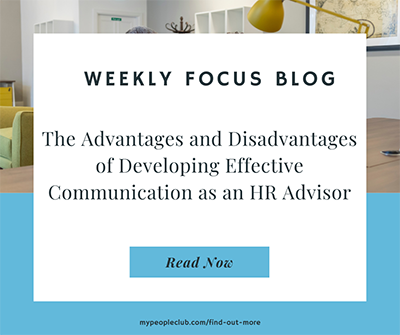As an HR professional, effective communication is an essential skill that can make a significant difference in your ability to support employees and drive positive change in your organisation. However, like any skill, developing effective communication has its pros and cons. In this blog, I’ll explore the advantages and disadvantages of developing effective communication as an HR pro.
Advantages:
Better Employee Relations: Effective communication helps you build better relationships with employees. When you communicate effectively, employees are more likely to trust you, feel heard, and feel supported.
More Productive Meetings: Meetings can be a significant drain on productivity, but effective communication can help you make them more efficient. When you communicate effectively in meetings, you can ensure that everyone is on the same page and that discussions are focused and productive.
Improved Conflict Resolution: Conflict is inevitable in any organisation, but effective communication can help you resolve conflicts more efficiently. When you communicate effectively, you can help parties involved in the conflict understand each other’s perspectives and find common ground.
Increased Engagement and Retention: Effective communication can help you engage employees and retain top talent. When you communicate effectively, employees feel valued and are more likely to stay with the organisation long-term.
Disadvantages:
Time-Consuming: There’s no overnight fix, developing effective communication can be time-consuming. Especially when you begin your journey, you may need to invest additional time in planning and preparing your communications.
Requires Patience and Persistence: You may not see immediate results, and you may need to continue working on your communication skills over time to see the desired outcomes.
Potential for Misunderstandings: There is always the potential for misunderstandings, even when you are communicating effectively. You need to be prepared to deal with these misunderstandings and work to resolve them when they occur.
Can be Emotionally Draining: As an HR professional, you may need to be prepared to handle difficult conversations and provide emotional support to employees when needed.
Investing time developing effective communication is a critical skill for those of us in HR. It can help you build better relationships with employees, increase engagement and retention, and improve conflict resolution. However, like most skills that push us past our comfort zones it requires time, patience, and persistence, and it can be emotionally draining. Our communication styles and delivery are something that will always require continuous development as we grow, we learn better ways to say, do and deliver things. You can get additional support, guides, and checklists on delivering and developing your communication on our platform, to find out more click here.

